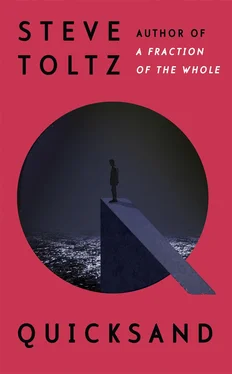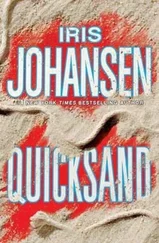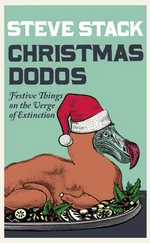— There’s nothing worse than lonely people who find each other and fail to connect, but no pressure.
With the salty wind like shadows of ghosts advancing from the sea, and the palms swaying, I took her in: the deceased was leggy and nearly as nearly beautiful as I remembered, with high, pushed-up breasts, her signature wild hair, and cannibal eyes glowing in the dark. We seemed overawed by each other and were both suffering the embarrassment of mutual attraction. Our faces were close together now, lips almost touching, but we had not yet kissed. A group of skinny men ran along the beach, the echo of their conspiratorial voices drawing us even closer together. Mimi wrapped her arms around my neck and I tasted cigarettes in her hair; we stood, cheeks together, almost-kissing in the unbroken silence for uncountable minutes. I tell you, ladies and gentlemen of the jury, it is eerie and unbelievably erotic almost-kissing a stranger in the dark.
— What are you thinking about? the deceased asked.
— Our retirement years, how it might be lovely to pool our superannuation, move to Byron Bay, and then die within twenty-four hours of each other — one from heart failure, the other from grief.
What’s that? OK, Mr Impatient, I’ll get to the point. And why shouldn’t I? The point is fantastic.
Rain may or may not have been falling. The deceased pressed her body heavily against mine and I could feel her silken lashes against my cheek and our faces did what faces do before we hurried back to her place to begin — as you’re so fond of saying— a sexual relationship . Is that concise enough for you? May I at least describe her residence, or would the prosecutor like the jury to have no sense of place or setting?
IX
Along a dull stretch of highway, Your Honour, north through hills and scrubland, off a desolate coastal road that winds along the cliff’s edge, there’s a narrow lane, and at the end of the lane, obscured by wild garden, stands a house hidden in the shadow of an enormous camphor tree. I stepped out of Mimi’s van into the wet morning; the earth was soft and everything shiftless and breezy. I followed the deceased through the front door of this ramshackle house into a large open room with ocean views, filled with pandemonium: there was a lanky man with shrivelled arms furiously turning over couch cushions while a girl in overalls said, Warm, warmer, now cold, colder. A Japanese girl drawing a guy with white dreadlocks cutting his toenails; bodies strewn on mildewed furniture, heads in laps, resting on groins, the shape of multiple carcasses twisting in a single hammock; carpets stained with paint and cigarette ash; candles melted down onto wine-stained tablecloths; guitars strewn on the ping-pong table; street signs and broken chairs, dried paint tubes, stiff unwashed brushes, and a piano on which you knew that some son of a bitch would soon be playing ‘Chopsticks’ or ‘Piano Man’. The atmosphere was vaguely thoughtless and erotic. It smelled of cats and kebabs and turpentine. I tripped over a ukulele. A laughing woman was giving a haircut to a dog with stitches in his coat, while sugared-up children ran wild around them, eating paint that most certainly contained lead. I asked, What the hell is this place? A squat? A commune? Mimi said, It’s an artists’ residency. The Hobbs Foundation. One of seventy now across Australia. Here we have mainly painters and sculptors, a couple of poets.
The children were running in circles and throwing shrivelled apples from a still life.
— Is there an actual parent around here? I asked.
— Plenty of societies, like the Spartans, got by just fine raising children as a society.
— Sure, I replied tersely, if you count their decline and eventual extinction as ‘getting on fine’.
Each room was crammed tight with easels and canvases and paints, and smelled of human sweat. I had the impression I couldn’t brush against a curtain without contracting hepatitis C. I heard dogs barking, but that turned out to be on the stereo.
Sidebar, Your Honour: What do I know about art? I was never an artist myself, even though as a child I knew that to ask someone why they were in a bad mood when they weren’t in a bad mood would put them in a bad mood — sometimes I did that just to change the energy in a room. And then, when I was older, it was a reliable pleasure to tell a newly formed couple they looked like brother and sister, and watch the spark of sexual chemistry flare out. Of course I knew the basic archetypes: bald vigorous Spaniard type vs. tormented Dutch ear-slicing type; the rejection-phobes vs. the rejection fetishists; those who put anything they daub or scribble up for sale vs. perfectionists who warm themselves on painting bonfires. Otherwise, it was Mr Morrell who’d taught me everything I knew to this point about art as a profession: the best artists are disillusioned by eight-thirty in the morning; the only perfection possible is to never begin; without context, a high-priced and much-feted conceptual masterpiece turns back into the embalmed shark or garbage pail that it is; artistic genius is often linked with insanity only because free time is the key factor in exacerbating mental illness; most artists are easily offended, save empathy for their work, but parcel it out sparingly in their lives; they cultivate animosity towards their audience and vehement contempt for their patrons. In short, as Mr Morrell elucidated, they are a beloved, magnificent, obstinate race of snake oil salesmen. Now that I think about it, Mr Morrell is the reason why I’m suspicious and even fearful of artists as a species, so when Mimi made brief introductions — Everyone, this is Aldo. Aldo, this is everyone — I braced myself. Good thing I did. Hi, they said. I’m Frank Rubinstein. I’m Nick Whiticker. I’m Eve Fairbanks. I’m Dan Wethercot.
— Why is everyone telling me their full names? I asked Mimi.
— They want to see if you’ve heard of them.
The onslaught continued: I’m Maria Hamilton. I’m Tristan Conrad. I’m Louise Bozowic. I nodded with a rigid smile and eyed the males in the group. Who had fucked Mimi? Who wanted to? Who would after I left? Was the coward who plastered pornographic posters huddled among them? Now I wonder: Was there a murderer among these artists? Shall we add them all, ladies and gentlemen of the jury, to the list of possible suspects?
Mimi led me into her bedroom; it was like the inside of a shantytown. We kissed again, and the deceased unbuttoned my shirt and registered shock at the sight of my scarred torso.
— What the hell happened to you?
— Oh, this and that.
She ran her fingers over the faded scars, the scratches that had never healed, and the stretchy burns where I had failed to incinerate.
— Seriously, what did you do, fuck a cat-o’-nine-tails?
— Is this going to be a problem?
She undressed, and there they were — her famous nipples, her famous birthmark! She nimbly unbuckled my belt but fumbled with the buttons on my fly. I think she was used to zippers. Members of the press, going to bed with a new woman is like having to learn a whole new operating system on the first day of work with the boss breathing down your neck. You can quote me on that.
All morning we talked, about my fears of immortality, about her sad upbringing — what an interesting woman! The deceased, I learned, was born into the type of family who wore headphones at the dinner table, who lived in navy-blue jogging pants, who never had a golden age. Her alcoholic mother had four children by three different fathers; hers was a gambler who’d blow inconceivable sums on horses and online casinos. She had a bipolar brother and a sister who got hooked on dirty methamphetamines, an ice monster who became something to scare the children with. Mimi’s childhood was played out in poker-machine enclaves, racetrack bars, and heroin-injecting rooms. They lived in Randwick, almost directly across from the Prince of Wales Hospital (the proximity of which encouraged them to fall apart: more than once Mimi would plop her mother in a shopping trolley they kept in the yard and wheel her over to emergency to get her stomach pumped). They took lunch in the hospital cafeteria, and got takeaway coffee from the machine at reception. On birthdays they bought flowers from the hospital gift shop, and regularly purchased toiletries from the hospital pharmacy. The soundtrack of her childhood was an ambulance siren. God took unprovoked swings at them too. They dealt with high blood pressure, pacemakers, epilepsy, type 2 diabetes and borderline personality disorders. There were accidents, brain injuries, bad-luck diseases; a severely autistic cousin lived with them for several years. And Mimi had to take care of them all. Clean. Shop. Wash. Dress. Cook. Feed. Toilet. Iron. Shave. Bathe. Change bandages. Run all over town. Lie to cops. Take orders from doctors. Appease social workers. Calm autistic cousin. Restrain bipolar brother. Sit through cold-turkey vigils with sister. Endure mother’s night terrors. Negotiate with father over finances. Tolerate her name called in impatient or solicitous voices. Hide booze. Hide smokes. Hide weed. Check oxygen tank. Lie to debt collectors. Manage welfare payments. Yell at doctor. Distribute antipsychotic medications. Accompany brother to court. Drag father home from racetrack. Drag brother out of pub brawls. Honour father’s forged cheques. Pick up body of collapsed mother. Retrieve stolen items from pawnshop. Perjure herself in court. Physically lift uncle. Administer intravenous medication. Fill exhaustive shopping lists. Weather age-inappropriate cleansing of opposite-gender genitalia. Endure her name being called in choked voices. In frustrated voices. In vehement, theatrical voices. Withstand sister’s aggravated assaults. Mourn mother both alive and dead. Her family didn’t mind inconveniencing her — this was the arrangement. Life as permanent errand! That explained, she said, her ability to draw a chair close to a bed without making a noise, apply a bandage in the dark, disinfect a wound, administer a morphine drip, spot a precancerous lesion. Just as I had learned amateur psychology, she had learned amateur nursing. Where I had read the APA Dictionary of Clinical Psychology and the Handbook of Psychological Assessment , she had read Fundamentals of Nursing and the Nursing Diagnostic Handbook . She knew how to take blood pressure. How to collect a urine sample from an unwilling donor. Dispense medication to an indisposed mouth. Maintain a patent airway during a seizure. Palpate firmly the upper right quadrant of the abdomen below the costovertebral angle.
Читать дальше











